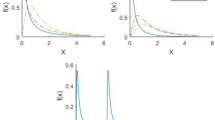Abstract
This paper has the purpose to show game theory (GT) applied to genetic algorithms (GA) as a new type of interaction between individuals of GA. The game theory increases the exploration potential of the genetic algorithm by changing the fitness with social interaction between individuals, avoiding the algorithm to fall in a local optimum. To increase the exploitation potential of this approach, this work will present the adjusted crossover operator and compare results to other crossover methods.
Access this chapter
Tax calculation will be finalised at checkout
Purchases are for personal use only
Similar content being viewed by others
References
Lev, O.: Modeling human interactions: facets of algorithmic game theory and computational social choice. In: Proceedings of the 13th International Conference on Autonomous Agents and Multiagent Systems (AAMAS 2014), Paris, France, 5–9 May 2014
Whitley, D.: A genetic algorithm tutorial. Stat. Comput. 4, 65–85 (1994)
Teixeira, O.N., Brito F.H., Lobato. W.A.L., Teixeira, A.N., Yasojima, C.T.K., Oliveira, R.C.L.: Fuzzy social interaction genetic algorithm. In: Proceedings of the 12th annual conference companion on Genetic and evolutionary computation (GECCO’10), pp. 2113–2114. ACM, New York, NY, USA (2010)
Beltra, R.L., Ochoa, G., Aickelin, U.: Cheating for problem solving: a genetic algorithm with social interactions. In: Proceedings of the 10th annual Conference on Genetic and Evolutionary Computation (GECCO’09), pp. 811–818. ACM, Montreal, Quebec, Canada (2009)
Goldberg, D.: Genetic Algorithms in Search Optimization and Machine Learning. Addison Wesley, Reading, USA (1989)
Wooldridge, M.: Does Game Theory Work? IEEE Intelligent Systems (2012)
Watson, J.: Strategy—An Introduction to Game Theory, 3rd edn. W. W. Norton & Company (2013)
Tomassini, M.: Introduction to evolutionary game theory. In: Proceedings of the 2014 Conference Companion on Genetic and Evolutionary Computation companion (GECCO Comp’14)
Deb, K.: Optimal design of a welded beam via genetic algorithms. AIAA J. 29(11), 2013–2015 (1991)
Sandgren, E.: Nonlinear integer and discrete programming in mechanical design. In: Proceeding of the ASME Design Technology Conference, pp. 95–105. Kissimmee, FL, (1988)
Golinski, J.: Optimal synthesis problems solved by means of nonlinear programming and random methods. J. Mech. 5, 287–309 (1970)
Belegundu, A.D.: A study of mathematical programming methods for structural optimization. Department of Civil and Environmental Engineering, University of Iowa, Iowa City, Iowa (1982)
Michalewicz, Z.: Genetic Algorithms + Data Structures = Evolution Programs, 2nd edn. Springer, New York (1994)
Wright, A.: Genetic algorithms for real parameter optimization. In: Rawlins, G.J.E. (ed.) Foundations of Genetic Algorithms, pp. 205–218. Morgan Kaufmann, San Mateo, CA (1991)
Author information
Authors and Affiliations
Corresponding author
Editor information
Editors and Affiliations
Rights and permissions
Copyright information
© 2016 Springer International Publishing Switzerland
About this paper
Cite this paper
Yasojima, E.K.K., de Oliveira, R.C.L., Teixeira, O.N., Lisbôa, R., Mollinetti, M. (2016). Analyzing Genetic Algorithm with Game Theory and Adjusted Crossover Approach on Engineering Problems. In: Abraham, A., Han, S., Al-Sharhan, S., Liu, H. (eds) Hybrid Intelligent Systems. HIS 2016. Advances in Intelligent Systems and Computing, vol 420. Springer, Cham. https://doi.org/10.1007/978-3-319-27221-4_15
Download citation
DOI: https://doi.org/10.1007/978-3-319-27221-4_15
Published:
Publisher Name: Springer, Cham
Print ISBN: 978-3-319-27220-7
Online ISBN: 978-3-319-27221-4
eBook Packages: EngineeringEngineering (R0)





